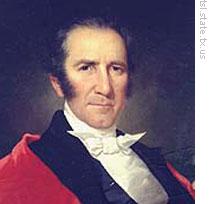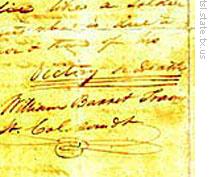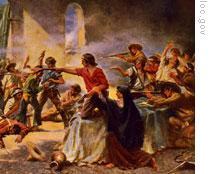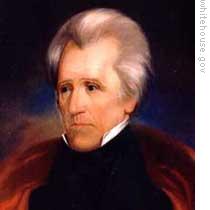VOA慢速英语 2008 1211b
时间:2018-12-01 作者:英语课 分类:VOA慢速英语2008年(十二)月
In the early eighteen thirties, the territory of Texas belonged to Mexico. But many Americans had moved to Texas because they could buy a lot of land with little money. The government of Mexico expected the settlers to speak Spanish, to become Roman Catholic and to accept Mexican traditions. The settlers did not want to.
For the most part, there was little that President Andrew Jackson could do. The United States had a treaty of friendship with Mexico. The government in Washington had a duty to remain neutral, even as the situation in Texas became increasingly tense.
Gwen Outen and Steve Ember tell the story in this week's program in our series.
VOICE ONE:
Americans in Texas held a convention in April eighteen thirty-three. They prepared a list of appeals to the leader of Mexico, General Santa Ana.
The Texas settlers asked Santa Ana to end a tax on goods imported into the territory. They asked him to lift a ban on new settlers from the United States. And they asked that Texas be organized as a separate state of Mexico.

Stephen Austin
One of the Americans, Stephen Austin, carried the appeals to Mexico City. He spent six months negotiating with the Mexican government. General Santa Ana promised to honor all the requests except one. He would not make Texas a separate state, although he said that might be possible someday. Stephen Austin was satisfied. He left the Mexican capital to return to Texas.
On his way home, to his surprise, Austin was arrested. He was arrested because of a letter he wrote earlier, when his negotiations 1 with Mexican officials seemed to be failing. He had said it might be best if the people declared Texas a separate state. Austin was put in prison in Mexico City for a year and a half.
VOICE TWO:
Austin urged the people of Texas to remain loyal to Mexico. But talk of rebellion already had begun. The settlers already were calling themselves "Texans."
Minor 2 hostilities 3 broke out between Texans and local Mexican officials. The Mexican army threatened action. When Austin returned from prison, he was chosen to negotiate with the commander of Mexican forces. The commander refused to negotiate. It appeared that war would come. The Texans began to organize their own army.
VOICE ONE:
In November eighteen thirty-five, representatives from all parts of Texas held a convention to discuss the situation. They had no plans to take Texas out of the Mexican Republic. In fact, a proposal to do that was defeated by a large vote.
However, the Texans took action to protect themselves against Santa Ana, who had declared himself dictator. They organized a temporary state government. They organized a state army. And they made plans for another convention to begin on March first.
VOICE TWO:

Sam Houston
Before the Texans could meet again, Santa Ana led an army of seven thousand men across the Rio Grande River into Texas. The first soldiers reached San Antonio on February twenty-third. The Texas forces withdrew to an old Spanish mission church called the Alamo.
On March first, the second Texas convention opened. This time, the representatives voted to declare Texas a free, independent and sovereign republic. They wrote a constitution based on the constitution of the United States. They created a government. David Burnet was named president. And Sam Houston was to continue as commander of Texas forces.
(MUSIC)
VOICE ONE:
On the second day of the convention, a letter came from the Alamo in San Antonio. The letter was addressed to the people of Texas and all Americans. The commander of Texas forces at the Alamo wrote:

''Victory or Death,'' the closing words of commander William Travis' letter from the Alamo
"I have been under an artillery 4 attack for twenty-four hours and have not lost a man. The enemy has demanded our surrender. Otherwise, he said, he will kill every one of us. I have answered his demand with a cannon 5 shot. Our flag still waves proudly from the walls. I shall never surrender or retreat.
"I call on you -- in the name of liberty, of patriotism 6, and everything dear to the American character -- to come to our aid with all speed. If my appeal is not answered, I will fight as long as possible, and die like a soldier who never forgets what he owes his own honor and that of his country."
The letter from the Alamo closed with the words: "Victory or Death."
VOICE TWO:
Representatives at the convention wanted to leave immediately to go to the aid of the Texans in San Antonio. But Sam Houston told them it was their duty to remain and create a government for Texas. Houston would go there himself with a small force.
The help came too late for the one hundred eighty-eight men at the Alamo. Santa Ana's forces captured the Spanish mission on March sixth. When the battle ended, not a Texan was left alive.
Sam Houston ordered all Texas forces to withdraw northeast -- away from the Mexican army.
VOICE ONE:

An artist's version of the Battle of the Alamo
One group of Texans did not move fast enough. Santa Ana trapped them. He said the Texans would not be harmed if they surrendered. They did. One week later, they were marched to a field and shot. Only a few escaped to tell the story.
Santa Ana then moved against Sam Houston. He was sure his large army could defeat the remaining Texas force.
President Andrew Jackson and Sam Houston were close friends. When told of Houston's retreat, the president pointed 7 to a map of Texas. He said: "If Sam Houston is worth anything, he will make his stand here.
Jackson pointed to the mouth of the San Jacinto River.
(MUSIC)
VOICE TWO:
The battle of San Jacinto began at four o'clock in the afternoon. There were about eight-hundred Texans. There were two times that many Mexicans. The Mexicans did not expect the retreating Texans to turn and fight. But they did.
Shouting "Remember the Alamo!" the Texans ran at the Mexican soldiers. Eighteen minutes later, the battle was over. Santa Ana's army was destroyed.
About half of the Mexicans were killed or wounded. The other half were captured. Only two Texans were killed. Twenty-three, including Sam Houston, were wounded.
VOICE ONE:
The Texans found Santa Ana the next day, wearing the clothes of a simple Mexican soldier. Santa Ana begged for mercy. Houston told him: "You might have shown some at the Alamo."
Many of the Texans wanted to shoot the Mexican general. But Houston said he was worth more alive than dead.
On May fourteenth, eighteen thirty-six, Texas President Burnet and General Santa Ana signed a treaty. The treaty made Texas independent.
(MUSIC)
VOICE TWO:
Eighteen thirty-six was a presidential election year in the United States. Andrew Jackson had served for eight years. He did not want another term. He supported his vice 8 president, Martin Van Buren.
Jackson's opposition 9 to the demands for more states' rights, and his attack on the Bank of the United States, had created problems for his Democratic Party. Texas also was a problem.
Slavery was legal in the new Republic of Texas. Most northerners in the United States opposed slavery anywhere. Jackson felt that if he recognized Texas, the Democrats 10 would lose votes in the presidential election. So Jackson decided 11 not to act on Texas until after the election.
VOICE ONE:
Opposition to the Democrats came from a coalition 12 political party. Members of the party called themselves Whigs. Three Whigs ran for president in eighteen thirty-six against Martin Van Buren.
The Whigs did not expect any of their candidates to win. But they hoped to get enough votes to prevent Van Buren from gaining a majority. Then the House of Representatives would have to decide the election. And a Whig might have a better chance. The plan failed. Van Buren won.
VOICE TWO:

Andrew Jackson
Andrew Jackson had only a few months left as president. It seemed that much of his time was occupied with one question. That was the request by the Republic of Texas to become a state of the union.
Jackson wanted to make Texas a state. But more important was the union itself. The issue of slavery in Texas was critical. Jackson said:
"To give statehood to Texas now, or to recognize its independence, would increase the bitterness between the north and south. Nothing is worth this price."
Then Jackson thought of a way in which statehood for Texas could bring the nation together, instead of splitting it apart.
That will be our story next week.
(THEME)
ANNOUNCER:
Our program was written by Frank Beardsley. The narrators were Gwen Outen and Steve Ember. Transcripts 13, MP3s and podcasts of our programs along with historical images are online at voaspecialenglish.com. Join us again next week for THE MAKING OF A NATION - an American history series in VOA Special English.
___
This is program #63 of THE MAKING OF A NATION
- negotiations for a durable peace 为持久和平而进行的谈判
- Negotiations have failed to establish any middle ground. 谈判未能达成任何妥协。
- The young actor was given a minor part in the new play.年轻的男演员在这出新戏里被分派担任一个小角色。
- I gave him a minor share of my wealth.我把小部分财产给了他。
- Mexico called for an immediate cessation of hostilities. 墨西哥要求立即停止敌对行动。
- All the old hostilities resurfaced when they met again. 他们再次碰面时,过去的种种敌意又都冒了出来。
- This is a heavy artillery piece.这是一门重炮。
- The artillery has more firepower than the infantry.炮兵火力比步兵大。
- The soldiers fired the cannon.士兵们开炮。
- The cannon thundered in the hills.大炮在山间轰鸣。
- His new book is a demonstration of his patriotism.他写的新书是他的爱国精神的证明。
- They obtained money under the false pretenses of patriotism.他们以虚伪的爱国主义为借口获得金钱。
- He gave me a very sharp pointed pencil.他给我一支削得非常尖的铅笔。
- She wished to show Mrs.John Dashwood by this pointed invitation to her brother.她想通过对达茨伍德夫人提出直截了当的邀请向她的哥哥表示出来。
- He guarded himself against vice.他避免染上坏习惯。
- They are sunk in the depth of vice.他们堕入了罪恶的深渊。
- The party leader is facing opposition in his own backyard.该党领袖在自己的党內遇到了反对。
- The police tried to break down the prisoner's opposition.警察设法制住了那个囚犯的反抗。
- The Democrats held a pep rally on Capitol Hill yesterday. 民主党昨天在国会山召开了竞选誓师大会。
- The democrats organize a filibuster in the senate. 民主党党员组织了阻挠议事。 来自《简明英汉词典》
- This gave them a decided advantage over their opponents.这使他们比对手具有明显的优势。
- There is a decided difference between British and Chinese way of greeting.英国人和中国人打招呼的方式有很明显的区别。
- The several parties formed a coalition.这几个政党组成了政治联盟。
- Coalition forces take great care to avoid civilian casualties.联盟军队竭尽全力避免造成平民伤亡。
- Like mRNA, both tRNA and rRNA are transcripts of chromosomal DNA. tRNA及rRNA同mRNA一样,都是染色体DNA的转录产物。 来自辞典例句
- You can't take the transfer students'exam without your transcripts. 没有成绩证明书,你就不能参加转学考试。 来自辞典例句